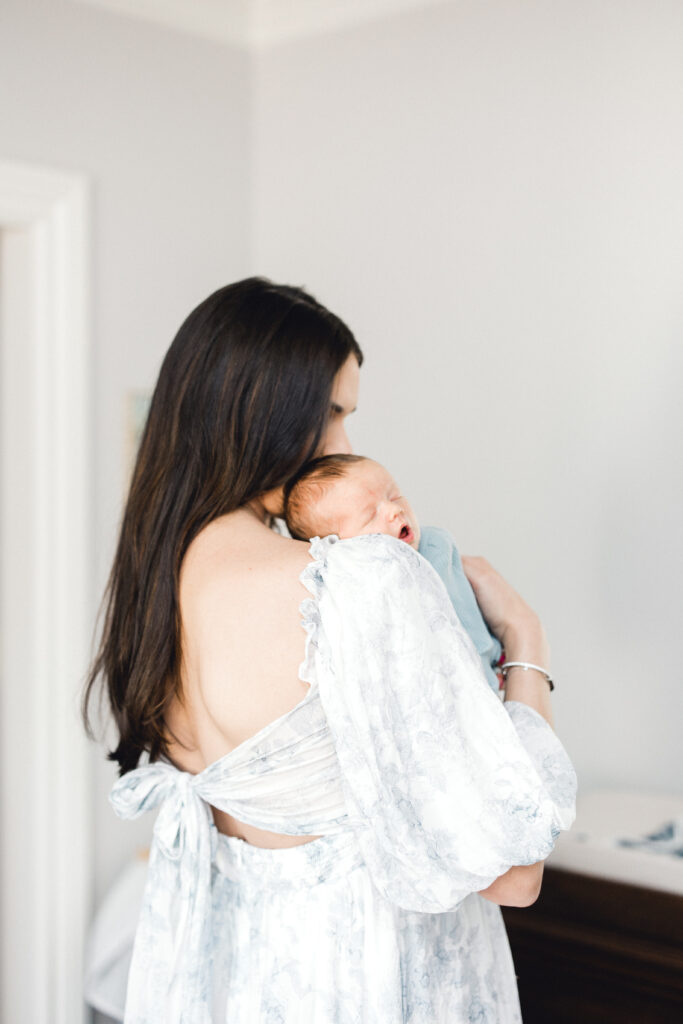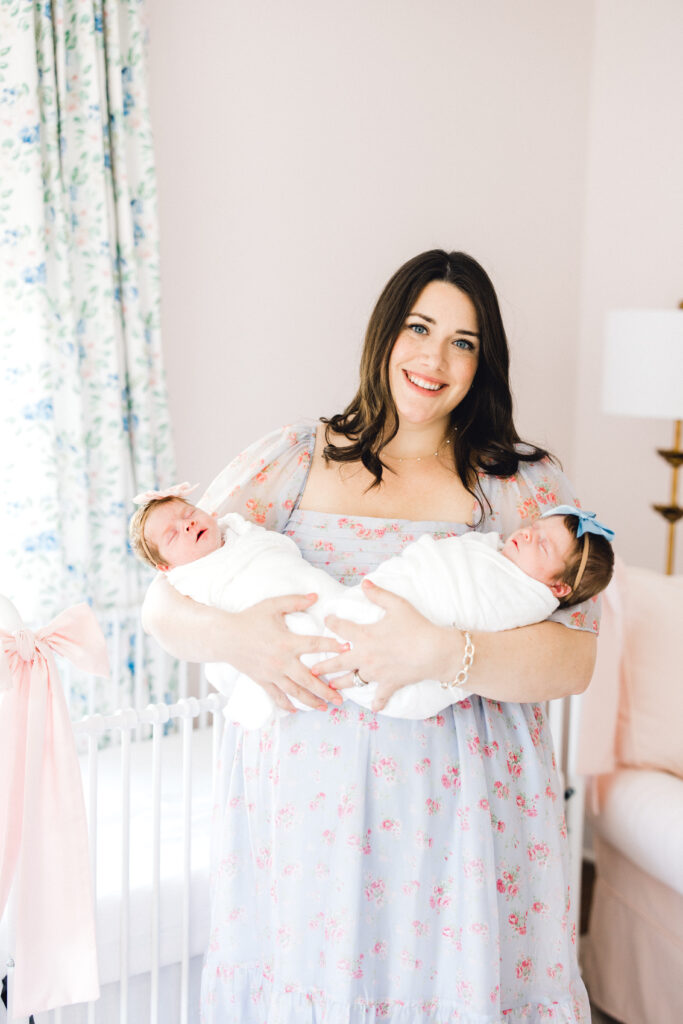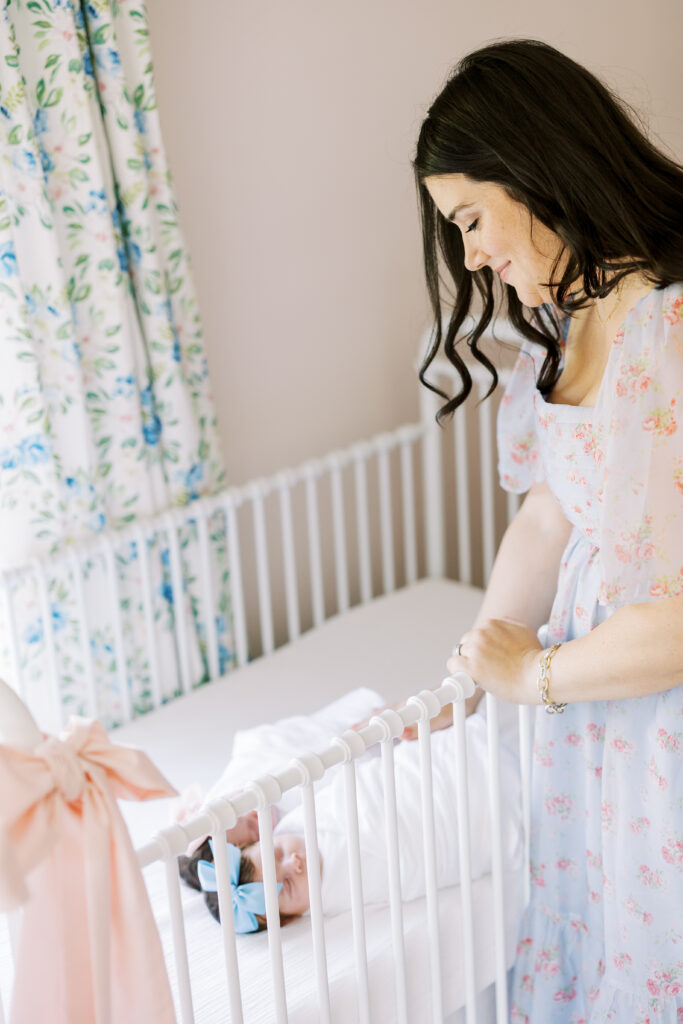
Bringing a new baby home is beautiful, but it can also feel overwhelming. As a newborn photographer here in Greensboro, I get a front-row seat to those first tender weeks — the sweet snuggles, the tiny details, and also the exhaustion and self-doubt that can sneak in when life suddenly changes overnight.
Because of that, I care about more than just creating heirloom photographs for my clients. I care about the whole experience of early motherhood — how you feel, how supported you are, and how you’ll remember these days when you look back on your images years from now.
That’s why I’m so honored to partner with Kathryn Beam, a perinatal mental health therapist, for this post. She’s answering common questions about what new moms experience emotionally, how to know when to reach out for help, and simple ways to care for yourself in the midst of it all. My hope is that this Q&A gives you not only beautiful photographs to look back on, but also support and reassurance for the season you’re in right now.

Meet Kathryn
Hi, I’m Kathryn! I’m a Perinatal Mental Health Therapist (more on that below!) located here in Greensboro, North Carolina. I am Perinatal Mental Health Certified through Postpartum Support International, and I feel passionate about supporting women through their pregnancy and postpartum journeys. I’m the mother of three children, and have experienced the highs and lows of pregnancy and postpartum myself. Throughout that time, here’s what I’ve learned:
I believe in the concept of Good Enough Mothering, recovery and repair in relationships, and radical self-compassion. I believe in “Matrescence,” or the period of mother-becoming; the internal, external, physiological, psychological, interpersonal shifts that occur as we navigate our new relationship with our partners, families, friends, bodies, feelings, and our very essence.
I believe in the knitting together of who we were with who we are in this moment, sewing together our maternal identity stitch by stitch. I believe that the echoes of the past impact our present, but that the reverse can also be true — our healing can reverberate through time, and it actually IS possible to give our past selves a big, warm hug. I believe in the mission of all postpartum women feeling seen, held, heard, and empowered.
Therapy can be a lifeline. It gives you space to say the things you might not feel safe saying elsewhere: the guilt, the fear, the grief, the anger, the unmet expectations. It’s a place to process identity shifts and relationship changes, or to simply sit with someone who sees you as you, not just “mom.” It’s not just in your head — our society is not set up to support moms in the way we so desperately need. That’s why therapy can be amazing — you don’t have to carry all of this alone.
So, let’s dive in!

Q&A with Kathryn Beam, LCMHCA, NCC, PMH-C — Perinatal Mental Health Therapist
Q: I just found out I’m pregnant! There is so much to think about and prepare for. I’m feeling totally overwhelmed!
A: How exciting; first of all, congratulations! It’s so easy to get swept up in checklists, gear guides, and all the planning that comes with pregnancy. What do you need for when the baby comes? Will you actually use that wipe warmer? (Hint: if you’re anything like me, you will not!) But something that often gets left behind in these discussions is the most important of all: YOU. How can we center your emotional well-being, both now and after the baby arrives? How do you care for your mental health during this big transition? How will you know if something feels off? What does life after birth actually look and feel like? These are big, important questions, and you’re not alone in asking (or not asking) them. A Perinatal Mental Health Therapist can help you prepare for the emotional side of this journey, not just the practical one.
Q: What is Perinatal Mental Health?
A: Perinatal is a term that is used to describe anything from the time of conception through the first year postpartum. A more common term might be “postpartum” or “postpartum counseling.” I like to think of Perinatal as broken down into “Peri” — meaning “around the time of” and “Natal,” meaning birth. Perinatal covers the time when you even begin imagining and dreaming of your own family, through until at least 2 years postpartum (and sometimes even a little beyond!). It might include challenges with infertility, miscarriage, pregnancy complications, a traumatic birth experience, or those early years navigating a new life postpartum, and everything in between. Postpartum is a time of immense personal, physical, relational, mental, and psychological change, where everything is in flux, so it makes sense that you would need some extra support!
Q: I’ve taken the surveys they give me at the OBGYN. I can feel that I’m struggling, but aren’t all new moms? I can’t tell if this is normal or not.
A: First of all, I just want to validate that normal is subjective, and postpartum is hard, even with all the right care in place! Your body, mind, and emotions just ran the equivalent of a marathon, and especially when it’s your first baby, we just don’t have a road map for what “normal” looks like yet. There are so many variables that go into what may look or feel normal for one person, but is very much a red flag for another. You may be asking yourself, “Isn’t it normal to be tired?! I just had a baby!” or “Aren’t I supposed to be a little emotional right now?” But, if you’re asking this question, chances are it’s worth exploring further. Some common signs include feeling persistently sad, anxious, irritable, disconnected from your baby or yourself, or like you’re barely holding it together. You might also notice changes in sleep or appetite that aren’t just from newborn life. Therapy isn’t just for when you’re at a breaking point — it’s a proactive step to care for your mental health before things get heavier.


Q: My mom keeps telling me I just have the Baby Blues, and that I’ll get over it soon, but I’m not so sure. What’s the difference between Baby Blues and something more serious?
A: The baby blues happen to around 60–80% of new moms. They typically start within a few days after birth and go away on their own within two weeks. You might feel tearful, moody, or emotionally raw — but you’re still generally functioning. If those feelings linger beyond two weeks, or feel more intense — like hopelessness, panic attacks, constant worry, or feeling numb or disconnected — it may be a sign of postpartum depression or anxiety. And that’s treatable, with the right support.
Q: My partner just gave birth, and something seems off. We’re both struggling, but she really doesn’t seem like herself. What should I do?
A: For any partners out there reading this — you are in a unique position to notice the early warning signs that your loved one may be struggling. If you are noticing persistent sadness, anxiety, irritability, tearfulness, or hopelessness, or if your partner is withdrawn and disconnected from the baby, it’s important to pay attention. Trust your instincts — if something feels off, it’s okay to gently check in and encourage them to seek support. This is an incredibly vulnerable time, and one of the best things you can do is help with the basics: make sure they’re eating, refill their water, and take the baby if (when!) they need a break — even if it’s just 10 quiet minutes alone. Remember, their whole world just changed, and adjustment takes time. You don’t have to fix everything. Just show up. Let’s ease into this season, together.
Q: Can I be struggling even if I love my baby?
A: Yes, 100%. Good moms feel frustrated, sad, and struggle too. This is a common misconception. You can love your baby deeply, and still feel overwhelmed, resentful, anxious, or depressed. These feelings don’t mean you’re failing, or that you don’t love your baby — they mean you’re human. Love doesn’t erase exhaustion or identity shifts and hormone crashes. Therapy can help you hold both truths: loving your baby AND needing support.
Q: Is it normal to feel lonely as a new mom?
A: Yes! And sadly, you’re not alone in feeling that way, even though it feels lonely. The early parenting days can be incredibly isolating, especially if your support system is limited or your life has changed more than you expected. Sleep deprivation, fewer social connections, and the nonstop needs of a newborn can make even the most connected person feel adrift. Naming that loneliness is powerful, and it’s something you don’t have to navigate alone.
Q: What if I don’t feel that “instant bond” everyone talks about with my baby?
A: That’s completely okay, and totally normal. It’s incredibly common to not feel an instant bond. You are meeting a tiny little stranger for the first time. Some parents feel a deep connection right away, but for others, it takes time. Bonding is a process, made up of a series of little moments, not a singular point in time. You’re not only understanding this new facet of who you are, and who your partner is, but you’re also getting to know a brand-new person while ALSO navigating hormones, healing, and exhaustion. Be gentle with yourself. Connection often grows slowly, through repeated moments of care — not all at once.
Q: How can I get in touch with you?
A: No one gives you an instruction manual for a baby. Much of the postpartum period is wading through the unknown, hoping to put the pieces together in a way that makes sense. You don’t have to go through this alone. If you are ready to have support in learning who you are as a mother, digging deep into your own feelings and struggles, and having a listening ear from someone who has been there, you can reach me through my website, kathrynbeamcounseling.com.
You can also reach me at 336-737-0677, or at kathryn@kathrynbeamcounseling.com. I can’t wait to connect.

There’s so much to navigate in the postpartum period — and you don’t have to do it alone.
Thank you so much to Kathryn for sharing her wisdom and compassion in this first part of our series. Supporting new moms goes far beyond beautiful images, and I’m honored to host these conversations here for you.
This is just Part 1 of our collaboration. Later this month we’ll be back with Part 2, diving even deeper into caring for yourself during the postpartum season — including what to do when you’re in the thick of it, how to ground yourself, where to find help, and even how family photos might be more healing than you expect.
In the meantime, if anything in this post resonated with you, please feel free to share it with a friend, leave a comment, or reach out to either of us. We’re here to remind you that you’re not alone.
Hi, I’m Lucy Miller—a Greensboro newborn, maternity, and family photographer specializing in luxury sessions that include a curated client wardrobe and custom artwork. I help families not only create meaningful images, but also turn them into heirlooms for their homes.
✨ I’d love to document this precious season for you. Reach out today to reserve your newborn session. Spaces are limited to ensure every family gets the time and attention they deserve.
📩 Get in touch here to book your newborn session.
Leave a Comment
Leave a Reply
As a mom to four little ones, I know firsthand how full this season of motherhood can feel — the mental load, the exhaustion, and the pressure to hold everything together. I remember being newly postpartum and how hard it felt just to get dressed for newborn photos, let alone coordinate outfits and feel present in the moment.
With a thoughtfully guided approach, I’ve created a photography experience that allows mothers to slow down and simply be — present, connected, and supported. Whether we’re photographing in your home or outdoors, my focus is always on natural connection and the quiet moments that reflect this season honestly, and are meant to be enjoyed long after.
Comments